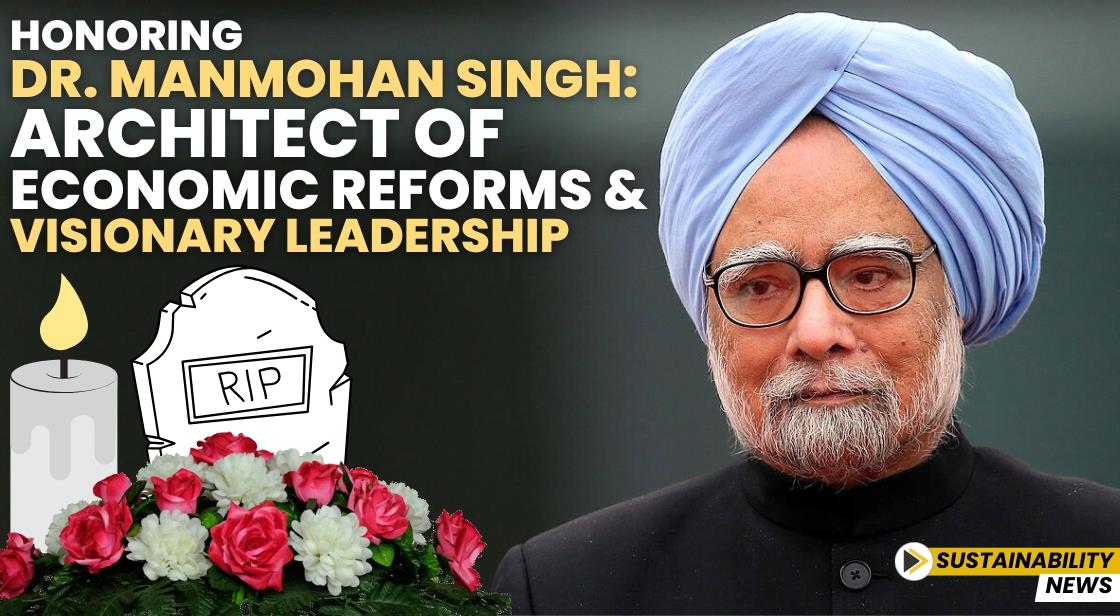Honoring Dr. Manmohan Singh: Architect of Economic Reforms and Visionary Leadership

News Synopsis
India mourned the loss of one of its most eminent leaders, Dr. Manmohan Singh, former Prime Minister and a towering figure in Indian politics. Dr. Singh passed away on Thursday at the age of 92 at AIIMS Delhi, where he had been admitted earlier that evening. His demise marks the end of an era defined by intellect, humility, and transformative leadership.
Political Journey of Dr. Manmohan Singh
Dr. Singh began his tenure as India’s 13th Prime Minister on May 22, 2004, following the Congress Party’s victory in the general elections. He was re-elected to office on the same date in 2009, serving two consecutive terms that left an indelible mark on India’s governance.
Born on September 26, 1932, in a village in Punjab province of undivided India, Dr. Singh’s journey from humble beginnings to the pinnacle of political leadership was extraordinary. After completing his matriculation from Punjab University in 1948, he embarked on a career that spanned academia, economics, and public service.
During his decades-long political career, Dr. Singh represented India on global platforms such as the Commonwealth Heads of Government Meeting (1993) and the World Conference on Human Rights (1993). He also served as a member of the Rajya Sabha from 1991 until his retirement in April 2024, including a tenure as the Leader of the Opposition from 1998 to 2004.
Landmark Achievements as Prime Minister
Dr. Singh’s tenure as Prime Minister was marked by several landmark initiatives that shaped India’s social and economic landscape.
-
Mahatma Gandhi National Rural Employment Guarantee Act (MGNREGA): Enacted in 2005, this program provided 100 days of guaranteed wage employment annually to rural households, creating a safety net for millions of families.
-
Right to Information Act (RTI): Implemented in 2005, the RTI Act empowered citizens by granting them access to public information, promoting transparency and accountability in governance.
-
National Food Security Act: Passed in 2013, this act ensured subsidized food grains for nearly two-thirds of India’s population, addressing hunger and malnutrition.
Academic Excellence of Dr. Manmohan Singh
Dr. Singh’s academic achievements were as remarkable as his political career. After completing his early education in Punjab, he pursued a First Class Honours degree in Economics from the University of Cambridge in 1957. He later earned a D. Phil in Economics from Nuffield College, Oxford, in 1962.
A noted scholar, Dr. Singh authored the influential book India's Export Trends and Prospects for Self-Sustained Growth in 1964, which critiqued India’s inward-looking trade policies. He also served as a faculty member at Punjab University and the Delhi School of Economics, where his work earned him a reputation as a leading economist.
Key Roles in Public Service
Dr. Singh’s career in public service began in 1971 when he joined the Government of India as an economic advisor in the Ministry of Commerce. Over the years, he held several key positions, including:
-
Chief Economic Advisor, Ministry of Finance (1972)
-
Secretary, Ministry of Finance
-
Deputy Chairman, Planning Commission
-
Governor, Reserve Bank of India (RBI)
-
Chairman, University Grants Commission (UGC)
-
Advisor to the Prime Minister
He also served as Secretary General of the South Commission in Geneva from 1987 to 1990. His extensive experience and insights into economic and social issues earned him respect both in India and internationally.
Transformative Economic Reforms
Dr. Singh’s tenure as Finance Minister from 1991 to 1996 under Prime Minister P.V. Narasimha Rao was a defining period in India’s economic history. He spearheaded a wave of liberalization reforms that opened up the Indian economy, paving the way for globalization, foreign investments, and market-driven growth. These reforms are widely credited with transforming India into one of the fastest-growing economies in the world.
Awards and Recognition of Dr. Manmohan Singh
Dr. Singh’s contributions earned him numerous accolades, including India’s second-highest civilian honor, the Padma Vibhushan, in 1987. His achievements as a scholar, economist, and leader remain a source of inspiration for generations to come.
Legacy of Dr. Manmohan Singh
Dr. Manmohan Singh’s legacy is one of vision, intellect, and unwavering commitment to India’s progress. He will be remembered not only as an eminent scholar and architect of economic reforms but also as a leader who championed transparency, social welfare, and economic resilience. His transformative impact on India’s political and economic landscape will continue to shape the nation’s future.
You May Like









